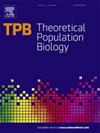On the sign of the average effect of an allele
IF 1.2
4区 生物学
Q4 ECOLOGY
引用次数: 0
Abstract
The concept of the average effect of an allele pervades much of evolutionary population genetics. In this context the average effect of an allele is often considered as the main component of the “fitness” of that allele. It is widely believed that, if this fitness component for an allele is positive, then the frequency of this allele will increase, at least for one generation in discrete-time models. In this note we show that this is not necessarily the case since the average effect of an allele on fitness may be different from its marginal additive fitness even in a one-locus setting in non-random-mating populations.
在等位基因平均效应的符号上
等位基因平均效应的概念在进化种群遗传学中广泛存在。在这种情况下,等位基因的平均效应通常被认为是该等位基因“适合度”的主要组成部分。人们普遍认为,如果一个等位基因的适应度成分是正的,那么这个等位基因的频率就会增加,至少在离散时间模型中会增加一代。在本文中,我们表明情况并非如此,因为即使在非随机交配种群的单位点环境中,等位基因对适应度的平均影响也可能与其边际附加适应度不同。
本文章由计算机程序翻译,如有差异,请以英文原文为准。
求助全文
约1分钟内获得全文
求助全文
来源期刊

Theoretical Population Biology
生物-进化生物学
CiteScore
2.50
自引率
14.30%
发文量
43
审稿时长
6-12 weeks
期刊介绍:
An interdisciplinary journal, Theoretical Population Biology presents articles on theoretical aspects of the biology of populations, particularly in the areas of demography, ecology, epidemiology, evolution, and genetics. Emphasis is on the development of mathematical theory and models that enhance the understanding of biological phenomena.
Articles highlight the motivation and significance of the work for advancing progress in biology, relying on a substantial mathematical effort to obtain biological insight. The journal also presents empirical results and computational and statistical methods directly impinging on theoretical problems in population biology.
 求助内容:
求助内容: 应助结果提醒方式:
应助结果提醒方式:


